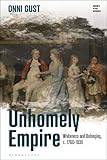Unhomely empire : whiteness and belonging, from the Scottish Enlightenment to liberal imperialism / Onni Gust.
Material type: TextLanguage: English Series: Empire's other historiesPublication details: London : Bloomsbury Academic, c2021.Description: 234p.; ill.; 9 x 6 inchesISBN:
TextLanguage: English Series: Empire's other historiesPublication details: London : Bloomsbury Academic, c2021.Description: 234p.; ill.; 9 x 6 inchesISBN: - 9781350128538
- 9781350128521
- Great Britain
- Home in literature
- White people
- Race awareness
- Belonging (Social psychology)
- Exiles in literature
- Enlightenment
- Imperialism in literature
- Emigration and immigration in literature
- -- Colonies -- Intellectual life
- -- Race identity -- Great Britain -- Colonies -- History -- 18th century
- -- Great Britain -- Colonies -- History -- 18th century
- Great Britain -- Colonies -- In literature
- 909.097 23 GUS
| Item type | Current library | Collection | Call number | Status | Date due | Barcode |
|---|---|---|---|---|---|---|
 General Books
General Books
|
CUTN Central Library History & Geography | Non-fiction | 909.097 GUS (Browse shelf(Opens below)) | Available | 46495 |
Includes bibliographical references and index.
The racialization of belonging in Adam Smith's Theory of Moral Sentiments -- Dugald Stewart and the colour of progress -- The role of 'home' in Edgeworth and Graham's critiques of slavery -- Colonial knowledge and the making of white masculinity in Bombay - "A hothouse of weeds" : reproducing white womanhood in colonial India -- Conclusion.
"Examining the discourse of 'home' and 'exile' in Enlightenment thought, this book explores its role in British imperial expansion during the 'long' 18th century. European imperial expansion radically increased population mobility through new trade routes, war, disease and labour, and by the 18th century millions of people were on the move. This book argues that this mass movement led to intellectual ideas and questions about what it meant to belong, and played a major role in the construction of racial difference in empire. Unhomely Empire maps the consolidation of an elite discourse of 'home' and 'exile' through three inter-related case studies and debates; slavery and abolition in the Caribbean, Scottish highland emigration to North America, and raising white girls in colonial India. Playing out over poetry, political pamphlets, travel writing, philosophy, letters and diaries, these debates offer a unique insight into the movement of ideas across a British-imperial literary network. Using this rich cultural material, Gust argues that these intellectual ideas in the long 18th century played a key role in determining who could belong to nation, civilization and humanity"--


There are no comments on this title.